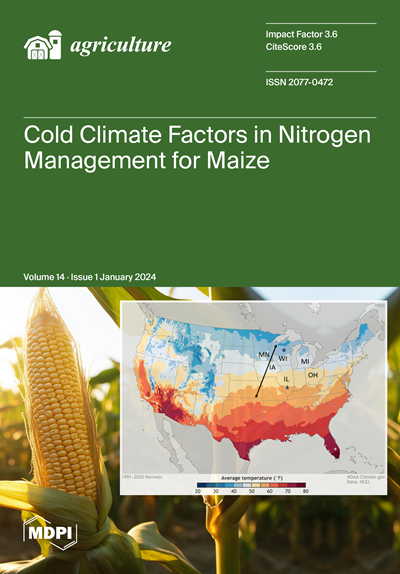The Efficacy of 5-Aminolevulinic Acid-Producing Luteovulum sphaeroides Strains on Saline Soil Fertility, Nutrient Uptakes, and Yield of Rice
IF 3.3
2区 农林科学
Q1 AGRONOMY
引用次数: 0
Abstract
Saline soils negatively affect and cause serious problems for rice cultivation. This study aimed to evaluate the efficacy of the purple nonsulfur bacteria (PNSB) capable of secreting 5-aminolevulinic acid (ALA) to reduce soil salinity, improve soil fertility, and enhance rice growth and yield. A two-factorial experiment was conducted in a randomized complete block design with four replications. Factor one was the salinity of the irrigated water, and factor two was the supplementation of the ALA-producing PNSB. The results indicated that watering with saline water above 3‰ led to decreases in plant growth and rice yield compared to the treatments watered with tap water. Application of either an individual strain or the mixture of W01, W14, and W22 ameliorated soil properties and increased total NPK uptake, whereas treatments supplied with the mixed strains reduced total Na uptake (9.50 mg Na pot−1). Supplying the W01, W14, and W22 strains individually or in a mixture enhanced the plant height by 3.51–5.45% and rice grain yield by 14.7–26.2%, compared with those of the control treatment. From the study, the combination of the L. sphaeroides W01, W14, and W22 strains is promising for application in saline or salt-contaminated regions to aid the damages caused by salinity on cultivars there, especially rice. Furthermore, this is a biological approach to ease an environmental problem and improve crop performance, which is supposed to be a trend in the sustainable agriculture.产5-氨基乙酰丙酸黄豆菌株对盐碱地肥力、养分吸收和水稻产量的影响
盐碱地对水稻种植产生负面影响并造成严重问题。本研究旨在评价能分泌5-氨基乙酰丙酸(ALA)的紫色非硫细菌(PNSB)降低土壤盐分、提高土壤肥力、促进水稻生长和产量的效果。双因子试验采用随机完全区组设计,共4个重复。因子一是灌溉水的盐度,因子二是产生ala的PNSB的补充。结果表明,与自来水处理相比,施用高于3‰的咸水对水稻植株生长和产量有一定的影响。单独施用或W01、W14和W22混合施用均改善了土壤性质,增加了氮磷钾的总吸收量,而混合施用则降低了总钠吸收量(9.50 mg Na pot - 1)。与对照处理相比,单独或混合施用W01、W14和W22株可使水稻株高提高3.51 ~ 5.45%,稻米产量提高14.7 ~ 26.2%。研究结果表明,sphaeroides W01、W14和W22菌株组合应用于盐渍或盐污染地区,可以缓解盐渍对当地品种特别是水稻造成的危害。此外,这是一种缓解环境问题和提高作物性能的生物方法,这应该是可持续农业的一个趋势。
本文章由计算机程序翻译,如有差异,请以英文原文为准。
求助全文
约1分钟内获得全文
求助全文
来源期刊

Agriculture-Basel
Agricultural and Biological Sciences-Food Science
CiteScore
4.90
自引率
13.90%
发文量
1793
审稿时长
11 weeks
期刊介绍:
Agriculture (ISSN 2077-0472) is an international and cross-disciplinary scholarly and scientific open access journal on the science of cultivating the soil, growing, harvesting crops, and raising livestock. We will aim to look at production, processing, marketing and use of foods, fibers, plants and animals. The journal Agriculturewill publish reviews, regular research papers, communications and short notes, and there is no restriction on the length of the papers. Our aim is to encourage scientists to publish their experimental and theoretical research in as much detail as possible. Full experimental and/or methodical details must be provided for research articles.
 求助内容:
求助内容: 应助结果提醒方式:
应助结果提醒方式:


